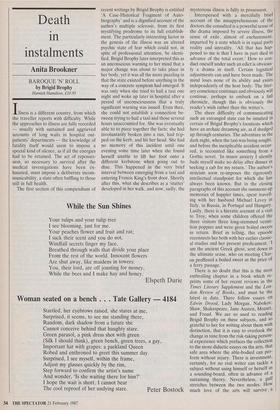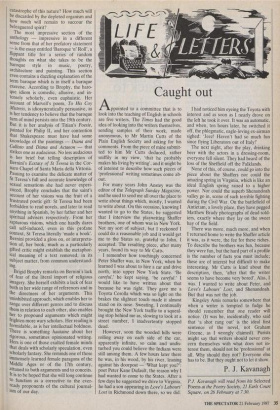Death in instalments
Anita Brookner
BAROQUE 'N' ROLL by Brigid Brophy
Hamish Hamilton, £10.95
Illness is a different country, from which the traveller reports with difficulty. While the approaches to illness are fully recorded — usually with sustained and aggrieved accounts of long waits in hospital out- patients' departments — the knowledge of fatality itself would seem to impose a special kind of silence, as if all the energies had to be retained. The act of reposses- sion, so necessary to survival after the medical investigations have been ex- hausted, must impose a deliberate incom- municability, a state often baffling to those still in full health.
The first section of this compendium of recent writings by Brigid Brophy is entitled `A Case-Historical Fragment of Auto- biography' and is a dignified account of the author's multiple sclerosis, from its first mystifying prodrome to its full establish- ment. The particularly interesting factor in the genesis of the illness was an altered psychic state of fear which could not, in spite of professional attention, be identi- fied. Brigid Brophy later interpreted this as an unconscious warning to her mind that a major change was about to take place in her body, yet it was all the more puzzling in that the state existed before anything in the way of a concrete symptom had emerged. It was only when she tried to hail a taxi one night and woke up later in hospital after a period of unconsciousness that a truly significant warning was issued. Even then, she could not establish a connection be- tween trying to hail a taxi and those several hours unaccounted for. She was eventually able to to piece together the facts: she had involuntarily broken into a run, had trip- ped on the kerb, and hit her head. She had no memory of this incident until one evening some time later when she found herself unable to lift her foot onto a different kerbstone when going out to dine. This happened in the very brief interval between emerging from a taxi and entering Francis King's front door. Shortly after this, what she describes as a 'stutter' developed in her walk, and now, sadly, the mysterious illness is fully in possession. Interspersed with a mercifully brief account of the misapprehensions of the doctors she consulted is a powerful sense of the drama imposed by severe illness, the sense of exile, almost of enchantment, imparted by a state which is in equal parts reality and unreality. 'All that has hap- pened to me is that I have in part died in advance of the total event.' How to con- duct oneself under such an edict is obvious- ly a drama in itself. Certain logistical adjustments can and have been made. The mind loses none of its ability and exists independently of the host body. The liter- ary conscience continues and obviously will continue, perhaps to embark on a full chronicle, though this is obviously the reader's wish rather than the writer's.
The sheer difficulty of communicating such an estranged state can be intuited in certain of Brigid Brophy's locutions which have an archaic dreaming air, as if dredged up through centuries. The adventure in the dark night, when the taxi was being sought, and before the inexplicable accident occur- red, is recounted like something from a Gothic novel. 'In minor anxiety I silently bade myself make no delay after dinner in Seeking a cab for my return.' The author's stoicism soon re-imposes the rigorously intellectual standpoint for which she has always been known. But in the closing paragraphs of this account she summons up memories of happier times, spent travell- ing with her husband Michael Levey in Italy, in Russia, in Portugal and Hungary. Lastly, there is a hieratic account of a visit to Troy, when some children offered the three visitors three long-stemmed vermi- lion poppies and were given boiled sweets in return. Brief in telling, this episode reconnects her both with her earlier classic- al studies and her present predicament. 'I am the ancient Greek ghost, sent down in the ultimate sense, who on meeting Char- on proffered a boiled sweet as the price of a ferry passage.' There is no doubt that this is the most enthralling chapter in a book which re- prints some of her recent reviews in the Times Literary Supplement and the Lon- don Review of Books, and must be the latest in date. There follow essays on Edwin Drood, Lady Morgan, Nabokov, Shaw, Shakespeare, Jane Austen, Mozart, and Freud. We are so used to reading Brigid Brophy on these subjects, and so grateful to her for writing about them with distinction, that it is easy to overlook the change in tone from the risk-taking person- al experience which prefaces the collection to the more didactic essays on the arts, that safe area where the able-bodied can per- form without injury. There is investment, certainly, for no real writer can tackle a subject without using himself or herself as a sounding-board, often in advance of a sustaining theory. Nevertheless, a gulf stretches between the two modes. How much love of the arts will survive , a catastrophe of this nature? How much will be discarded by the depleted organism and how much will remain to succour the beleaguered spirit? The most impressive section of the anthology — impressive in a different sense from that of her prefatory statement —is the essay entitled 'Baroque 'n' Roll', a flippant title for a series of random thoughts on what she takes to be the baroque style in music, poetry, architecture and painting. This section even contains a dazzling explanation of the term baroque which is in itself a baroque exercise. According to Brophy, the baro- que idiom is comedic, allusive, and in- tensely scholarly, even euphuistic. Her account of Marvell's poem, To His Coy Mistress, is idiosyncratically persuasive, as is her tendency to believe that the baroque turn of mind persists into the 19th century. But it is her analysis of Titian's Poesie, painted for Philip II, and her contention that Shakespeare must have had some knowledge of the paintings — Diana and Callisto and Diana and Actaeon — that strikes one as audacious. No less audacious is her brief but telling description of Bernini's Ecstasy of St Teresa in the Cor- naro Chapel of Santa Maria della Vittoria. Pausing to examine the delicate matter of St Teresa's full and accurate knowledge of sexual sensations she had never experi- enced, Brophy concludes that the saint's account of her visions was the fruit of a frustrated poetic gift: St Teresa had been forbidden to read novels, and later to read anything in Spanish, by her father and her spiritual advisers respectively. From her rapturous visions, which one hardly dares call self-induced, even in this profane context, St Teresa literally 'made a book'. Bernini provided a gloss on, or interpreta- tion of, her book, much as a particularly gifted critic might establish the metaphor- ical meaning of a text removed, in its subject matter, from common understand- ing.
Brigid Brophy remarks on Bernini's lack of fear of the literal import of religious imagery. She herself exhibits a lack of fear both in her wide range of references and in the directness of her arguments. This uninhibited approach, which enables her to range over different genres and to discuss them in relation to each other, also enables her to propound arguments which might frighten more wary scholars. Her reading is formidable, as is her intellectual boldness. There is something hautaine about her rigorous, sometimes opinionated writing. Hers is one of those exalted female minds that deals with scholarly speculation, even scholarly fantasy. She reminds one of those immensely learned female paragons of the Middle Ages or of the 17th century, attuned to both arguments and to conceits. It is to be hoped that she will long continue to function as a corrective to the ever- ready proponents of the cultural journal- ism of our day.



















































 Previous page
Previous page